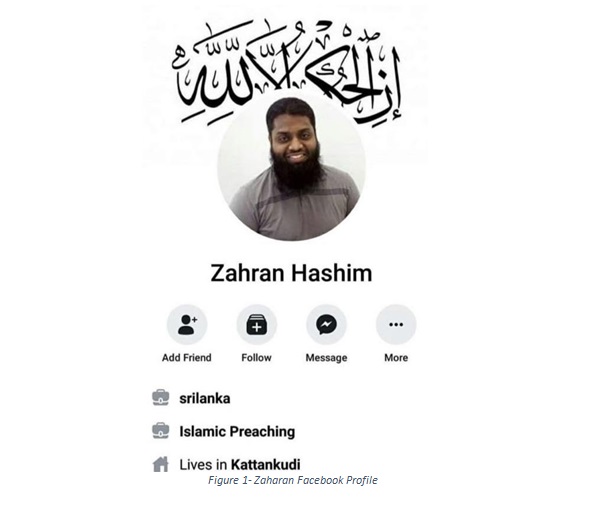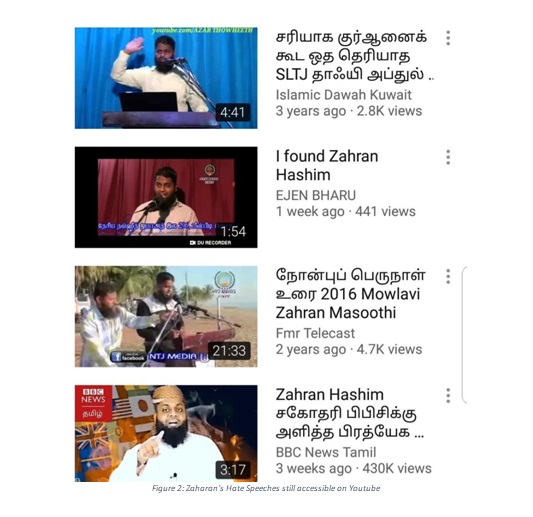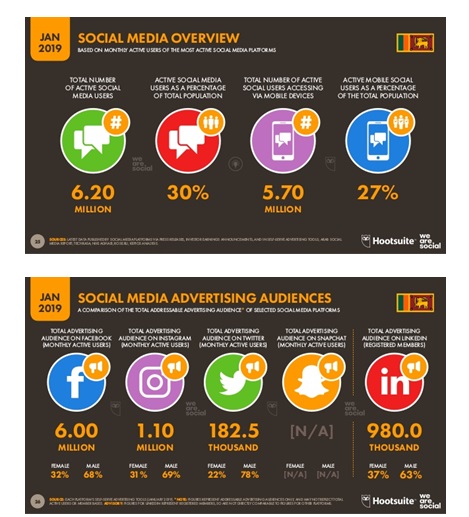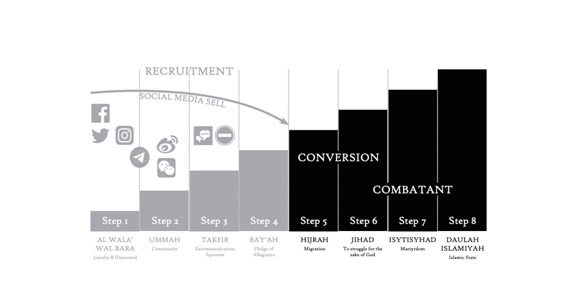.webp)

Terrorism 3.0: Rise of Social Media based Radicalization in Sri Lanka
Internet growth in Sri Lanka
Sri Lanka has achieved phenomenal growth when considering the online connectivity of Sri Lankans mostly thanks to a booming Telecommunication sector that has brought cutting edge technology (E.g. 4G/5G) to the local market. As of January 2019 there are 7.13 Mn Internet users in Sri Lanka (Internet penetration stands at 34%) , of those 5.7Mn (almost 80%) connect to the internet using their smartphones. Almost 87% of Sri Lankans who are online have social media accounts, with 85% of them having Facebook Accounts.

 Terrorism 3.0 is radicalization, recruitment, and operation of terror networks purely based on social media and virtual decentralized groups. Recruitment is done via social media while communications and operations facilitated via highly encrypted messaging apps (E.g. Messaging Apps like “Threema”)
Terror networks like ISIS have developed World War Two style propaganda campaigns that now play out in News (AMAQ agency and global coverage), Video (YouTube, News and Terror updates), Audio (sound clips, podcasts and audio tweets), Social (Facebook, Instagram, Snapchat, Twitter, Weibo, etc.), Video Game mods (ARMA 3) as well as in social campaigns tied to #hashtags.
ISIS terror group’s primary recruitment methodology leverages online social media tools and messaging that are structured similar to run like marketing campaigns similar to the best fortune 500 companies’ Facebook’s own Filter Bubbles and Echo chambers make this process seamless for terror recruiters as the radicalization of their world view has already been indoctrinated by Facebook algorithms.
There are estimates that ISIS operates a network of about 1,000 social and digital media operatives globally, making their staff more numerous than many large public relations agencies.
Their recruitment process starts with glossy English-language publications like Dabiq, and social seeds and hashtags across the social web. Dedicated websites on the Darkweb and readily available ISIS propaganda online are coupled with a recruitment process that is socially geared towards the disenfranchised millennial audiences.
Once a prospect starts communicating with an ISIS recruiter, they are quickly further radicalized by incentivizing a “bill of goods” that include, opportunities to lead or to find a “meaningful life and place”. The recruitment process involves an initial pledge, as well as the standard cult tactics of cutting off friends and family for a new “peer and social group”. Once this occurs, they are led to excommunicate their family, all religious elements in their life, and take an oath of allegiance to ISIS. This entire process is led by social media platforms and secure messaging apps.
Terrorism 3.0 is radicalization, recruitment, and operation of terror networks purely based on social media and virtual decentralized groups. Recruitment is done via social media while communications and operations facilitated via highly encrypted messaging apps (E.g. Messaging Apps like “Threema”)
Terror networks like ISIS have developed World War Two style propaganda campaigns that now play out in News (AMAQ agency and global coverage), Video (YouTube, News and Terror updates), Audio (sound clips, podcasts and audio tweets), Social (Facebook, Instagram, Snapchat, Twitter, Weibo, etc.), Video Game mods (ARMA 3) as well as in social campaigns tied to #hashtags.
ISIS terror group’s primary recruitment methodology leverages online social media tools and messaging that are structured similar to run like marketing campaigns similar to the best fortune 500 companies’ Facebook’s own Filter Bubbles and Echo chambers make this process seamless for terror recruiters as the radicalization of their world view has already been indoctrinated by Facebook algorithms.
There are estimates that ISIS operates a network of about 1,000 social and digital media operatives globally, making their staff more numerous than many large public relations agencies.
Their recruitment process starts with glossy English-language publications like Dabiq, and social seeds and hashtags across the social web. Dedicated websites on the Darkweb and readily available ISIS propaganda online are coupled with a recruitment process that is socially geared towards the disenfranchised millennial audiences.
Once a prospect starts communicating with an ISIS recruiter, they are quickly further radicalized by incentivizing a “bill of goods” that include, opportunities to lead or to find a “meaningful life and place”. The recruitment process involves an initial pledge, as well as the standard cult tactics of cutting off friends and family for a new “peer and social group”. Once this occurs, they are led to excommunicate their family, all religious elements in their life, and take an oath of allegiance to ISIS. This entire process is led by social media platforms and secure messaging apps.



 Terrorism 3.0 is radicalization, recruitment, and operation of terror networks purely based on social media and virtual decentralized groups. Recruitment is done via social media while communications and operations facilitated via highly encrypted messaging apps (E.g. Messaging Apps like “Threema”)
Terror networks like ISIS have developed World War Two style propaganda campaigns that now play out in News (AMAQ agency and global coverage), Video (YouTube, News and Terror updates), Audio (sound clips, podcasts and audio tweets), Social (Facebook, Instagram, Snapchat, Twitter, Weibo, etc.), Video Game mods (ARMA 3) as well as in social campaigns tied to #hashtags.
ISIS terror group’s primary recruitment methodology leverages online social media tools and messaging that are structured similar to run like marketing campaigns similar to the best fortune 500 companies’ Facebook’s own Filter Bubbles and Echo chambers make this process seamless for terror recruiters as the radicalization of their world view has already been indoctrinated by Facebook algorithms.
There are estimates that ISIS operates a network of about 1,000 social and digital media operatives globally, making their staff more numerous than many large public relations agencies.
Their recruitment process starts with glossy English-language publications like Dabiq, and social seeds and hashtags across the social web. Dedicated websites on the Darkweb and readily available ISIS propaganda online are coupled with a recruitment process that is socially geared towards the disenfranchised millennial audiences.
Once a prospect starts communicating with an ISIS recruiter, they are quickly further radicalized by incentivizing a “bill of goods” that include, opportunities to lead or to find a “meaningful life and place”. The recruitment process involves an initial pledge, as well as the standard cult tactics of cutting off friends and family for a new “peer and social group”. Once this occurs, they are led to excommunicate their family, all religious elements in their life, and take an oath of allegiance to ISIS. This entire process is led by social media platforms and secure messaging apps.
Terrorism 3.0 is radicalization, recruitment, and operation of terror networks purely based on social media and virtual decentralized groups. Recruitment is done via social media while communications and operations facilitated via highly encrypted messaging apps (E.g. Messaging Apps like “Threema”)
Terror networks like ISIS have developed World War Two style propaganda campaigns that now play out in News (AMAQ agency and global coverage), Video (YouTube, News and Terror updates), Audio (sound clips, podcasts and audio tweets), Social (Facebook, Instagram, Snapchat, Twitter, Weibo, etc.), Video Game mods (ARMA 3) as well as in social campaigns tied to #hashtags.
ISIS terror group’s primary recruitment methodology leverages online social media tools and messaging that are structured similar to run like marketing campaigns similar to the best fortune 500 companies’ Facebook’s own Filter Bubbles and Echo chambers make this process seamless for terror recruiters as the radicalization of their world view has already been indoctrinated by Facebook algorithms.
There are estimates that ISIS operates a network of about 1,000 social and digital media operatives globally, making their staff more numerous than many large public relations agencies.
Their recruitment process starts with glossy English-language publications like Dabiq, and social seeds and hashtags across the social web. Dedicated websites on the Darkweb and readily available ISIS propaganda online are coupled with a recruitment process that is socially geared towards the disenfranchised millennial audiences.
Once a prospect starts communicating with an ISIS recruiter, they are quickly further radicalized by incentivizing a “bill of goods” that include, opportunities to lead or to find a “meaningful life and place”. The recruitment process involves an initial pledge, as well as the standard cult tactics of cutting off friends and family for a new “peer and social group”. Once this occurs, they are led to excommunicate their family, all religious elements in their life, and take an oath of allegiance to ISIS. This entire process is led by social media platforms and secure messaging apps.

Other Articles
Featured News





.png )
-819380_550x300.jpg)


-812087_550x300.jpg)
-810262_550x300.jpg)
-809496_550x300.jpg)




















.gif)